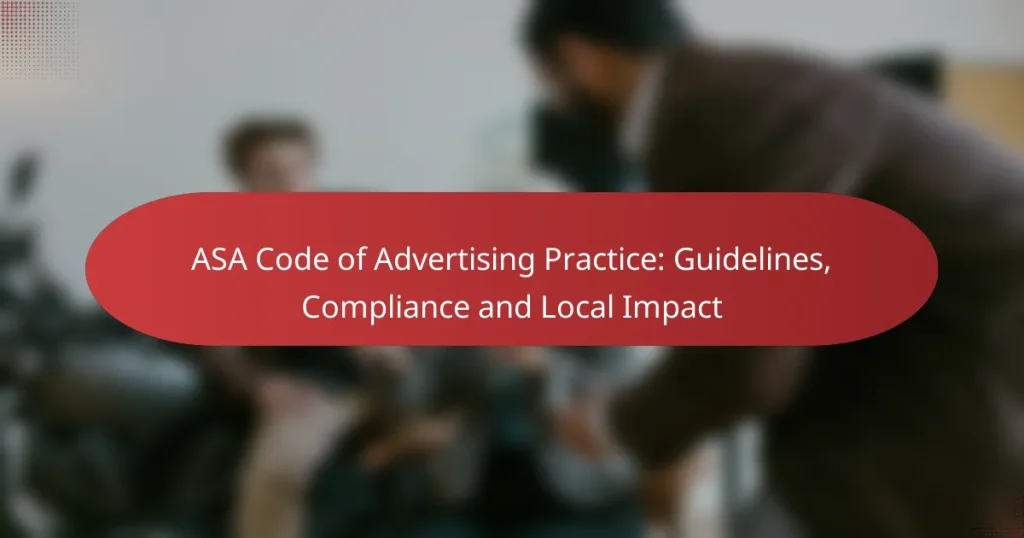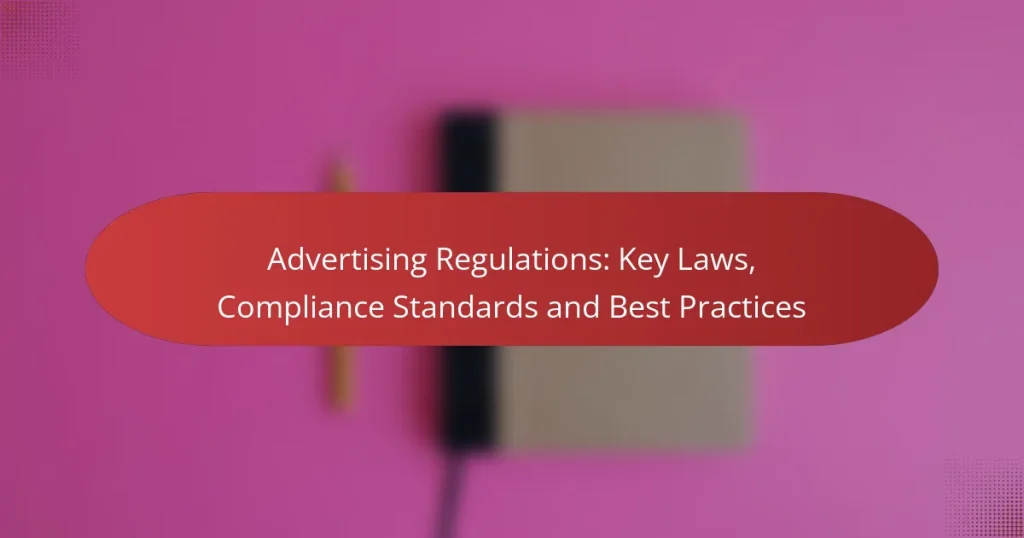Truth in advertising is essential for maintaining consumer trust and ensuring legal compliance. In South Africa, advertisers must follow the Consumer Protection Act and guidelines from the Advertising Standards Authority, ensuring that all claims are truthful and substantiated. Non-compliance can result in severe penalties, including financial repercussions and damage to brand reputation, making it crucial for businesses to implement systematic strategies for adherence to advertising laws.
Consumer Protection Laws: Compliance, Advertising Standards and Best Practices
Advertising Compliance: E-commerce Platforms, Regulations and Best Practices
GDPR Impact: Digital Advertising, Compliance Challenges and Consumer Rights
Transparent Advertising: Legal Compliance, Consumer Trust and Ethical Standards
Advertising Regulations: Key Laws, Compliance Standards and Best Practices
Compliance Audit: Advertising Campaigns, Best Practices and Legal Requirements
What are the legal requirements for advertising in South Africa?
In South Africa, legal requirements for advertising include adherence to the Consumer Protection Act and guidelines set by the Advertising Standards Authority. Advertisers must ensure that their claims are truthful, not misleading, and substantiated by evidence.
Consumer Protection Act compliance
The Consumer Protection Act (CPA) aims to promote fair, accessible, and sustainable marketplace practices. Advertisers must provide accurate information about their products and services, ensuring that all claims can be substantiated. Misleading advertising practices, such as false claims or omissions of critical information, can lead to penalties and consumer complaints.
To comply with the CPA, businesses should regularly review their advertising materials and ensure that all representations align with the actual product or service. This includes avoiding exaggerated claims that cannot be supported by factual evidence.
Advertising Standards Authority guidelines
The Advertising Standards Authority of South Africa (ASA) sets out guidelines that govern ethical advertising practices. Advertisers must ensure that their advertisements are not offensive, misleading, or harmful. The ASA provides a framework for resolving disputes and complaints regarding advertisements, which can lead to corrective actions if necessary.
Compliance with ASA guidelines involves understanding the specific rules related to various advertising mediums, including print, digital, and broadcast. Advertisers should familiarize themselves with these guidelines to avoid potential sanctions or reputational damage.
Truth in Advertising principles
Truth in Advertising principles emphasize honesty and transparency in marketing communications. Advertisers should ensure that all claims are clear, truthful, and substantiated to maintain consumer trust. This includes avoiding vague language and ensuring that any disclaimers are prominently displayed.
To uphold these principles, businesses should conduct regular audits of their advertising content and seek legal advice when necessary. Implementing a review process can help identify potential issues before advertisements are published, reducing the risk of misleading consumers.
How can businesses ensure compliance with advertising laws?
Businesses can ensure compliance with advertising laws by implementing systematic strategies that include regular audits, training for marketing teams, and consulting legal experts. These steps help identify potential legal issues and maintain adherence to regulations governing advertising practices.
Regular legal audits
Conducting regular legal audits is essential for businesses to identify and rectify compliance gaps in their advertising strategies. These audits should review all advertising materials, including digital content, print ads, and promotional campaigns, to ensure they meet relevant legal standards.
Audits can be scheduled quarterly or biannually, depending on the scale of the advertising efforts. A checklist for audits might include verifying claims, checking for proper disclosures, and ensuring that all content is free from misleading information.
Training for marketing teams
Training marketing teams on advertising laws is crucial for fostering a culture of compliance. Regular workshops and training sessions can educate employees about the legal implications of their advertising strategies and the importance of truthful messaging.
Consider providing resources such as guidelines or handbooks that outline key regulations, including the Federal Trade Commission (FTC) rules in the U.S. or similar standards in other countries. This proactive approach can significantly reduce the risk of unintentional violations.
Consulting legal experts
Engaging legal experts can provide businesses with tailored advice on navigating complex advertising laws. Legal consultants can review advertising campaigns before launch, ensuring that all materials comply with current regulations and industry standards.
It is advisable to establish a relationship with a legal professional who specializes in advertising law, as they can offer ongoing support and updates on any changes in legislation. This partnership can be invaluable in avoiding costly legal disputes and maintaining a reputable brand image.
What are the consequences of non-compliance in advertising?
Non-compliance in advertising can lead to significant repercussions, including financial penalties, damage to brand reputation, and potential legal actions from consumers. Companies must adhere to advertising regulations to avoid these serious consequences.
Fines and penalties
Advertising non-compliance can result in hefty fines and penalties imposed by regulatory bodies. These fines can range from hundreds to millions of dollars, depending on the severity of the violation and the jurisdiction. For instance, in the United States, the Federal Trade Commission (FTC) can impose fines for misleading advertisements.
In addition to direct fines, companies may also face increased scrutiny and additional costs related to compliance audits and legal fees. It’s crucial for businesses to stay informed about advertising laws to mitigate these financial risks.
Reputational damage
Non-compliance can severely harm a brand’s reputation, leading to a loss of consumer trust. When consumers perceive a brand as dishonest or misleading, they are less likely to engage with or recommend that brand. This reputational damage can take years to repair and may result in decreased sales.
To protect their reputation, companies should prioritize transparency and honesty in their advertising practices. Regularly reviewing marketing materials for compliance can help prevent reputational harm.
Legal action from consumers
Consumers may take legal action against companies that engage in misleading advertising practices. This can include class-action lawsuits or individual claims for damages, which can be costly and time-consuming for businesses. Legal actions can arise from false claims, deceptive practices, or failure to disclose important information.
To avoid such legal challenges, companies should ensure that their advertising claims are substantiated and that all necessary disclosures are made clearly. Implementing a robust compliance program can help reduce the risk of consumer lawsuits.
What are common pitfalls in advertising compliance?
Common pitfalls in advertising compliance include misleading claims, failure to disclose sponsorships, and inaccurate pricing information. These issues can lead to legal consequences and damage to brand reputation.
Misleading claims
Misleading claims occur when advertisements present false or exaggerated information about a product or service. This can mislead consumers and violate advertising laws, resulting in penalties.
To avoid misleading claims, ensure that all statements about your product are truthful and substantiated. For example, if you claim a product is “the best,” provide evidence to support that assertion.
Failure to disclose sponsorships
Failure to disclose sponsorships can mislead consumers about the nature of endorsements or partnerships. Regulations often require clear disclosure when content is sponsored or when influencers are paid to promote products.
To comply, always include clear disclaimers in sponsored content, such as “Paid partnership” or “Sponsored by.” This transparency helps maintain trust with your audience and adheres to legal standards.
Inaccurate pricing information
Inaccurate pricing information can mislead consumers and lead to complaints or legal action. Advertisements must reflect the true cost of products, including any additional fees or conditions.
To ensure accuracy, regularly update pricing information in your ads and clearly state any terms that may affect the final price, such as “plus tax” or “limited time offer.” This practice helps avoid confusion and maintains compliance.
How to choose an advertising compliance consultant?
Choosing an advertising compliance consultant involves assessing their expertise in legal standards and their ability to navigate the complexities of advertising regulations. Look for consultants who have a strong background in compliance, particularly in your specific industry and locale.
Experience in South African law
When selecting a consultant, ensure they have substantial experience with South African advertising laws, including the Consumer Protection Act and the Advertising Standards Authority guidelines. Familiarity with local regulations is crucial for ensuring that your advertising strategies are compliant and effective.
Consultants should demonstrate a track record of successfully advising businesses on compliance issues, ideally with case studies or examples relevant to your sector. This experience can help mitigate risks associated with non-compliance, which can lead to financial penalties or reputational damage.
Client testimonials
Client testimonials provide insight into a consultant’s effectiveness and reliability. Look for reviews that highlight their understanding of advertising compliance and their ability to deliver results.
Consider reaching out to past clients for direct feedback about their experiences. Positive testimonials often indicate a consultant’s capability to navigate complex regulations and provide valuable guidance tailored to your needs.
Service offerings
Evaluate the range of services offered by the consultant, including compliance audits, training programs, and ongoing support. A comprehensive service package can help ensure that your advertising practices remain compliant over time.
Some consultants may also offer specialized services, such as risk assessments or crisis management strategies, which can be beneficial if your business faces potential compliance issues. Understanding what each consultant provides will help you choose one that aligns with your specific requirements.






